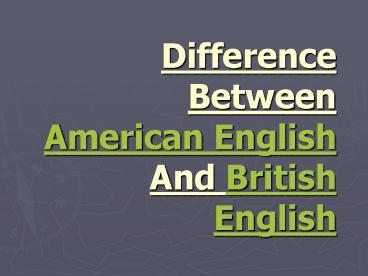Difference Between American English And British English PowerPoint PPT Presentation
1 / 10
Title: Difference Between American English And British English
1
Difference Between American English And British
English
2
AMERICAN ENGLISH
- American English (AmE) is the form of English
used in the United States. - American English in its written form is
standardized across the U.S. (and in schools
abroad specializing in American English). - American speech is somewhat uniform throughout
the country, largely because of the influence of
mass communication and geographical and social
mobility in the United States
3
BRITISH ENGLISH
- British English (BrE) is the form of English used
in the United Kingdom and the rest of the British
Isles. It includes all English dialects used
within the British Isles. - British English has a reasonable degree of
uniformity in its formal written form. On the
other hand, the forms of spoken English
dialects and vocabulary used across the British
Isles vary considerably more than in most other
English-speaking areas of the world.
4
Historical background
- The English language was first introduced to the
Americas by British, beginning in the late 16th
century. Similarly, the language spread to
numerous other parts of the world as a result of
British colonization elsewhere and the spread of
the former British Empire, which, by 1921, held
sway over a population of about 470570 million
people approximately a quarter of the world's
population.
5
PRONUNCIATION
- GRAMMAR
- SINGULAR AND PLURAL FOR NOUNS
- For Example, In British "the team are
worried" American "the team is worried".
Americans may use the plural form when the
individual membership is clear, for example, "the
team take their seats" (not "the team takes its
seat (s), although it is almost always rephrased
to avoid the singular/plural decision, as in "the
team members take their seats".
6
PHRASEL VERBS
- In the U.S., forms are usually but not invariably
filled out, but in Britain they can also be
filled in. However, in reference to individual
parts of a form, Americans may also use in ("fill
in the blanks"). In AmE the direction "fill it
all in" (referring to the form as a collection of
blanks, perhaps) is as common as "fill it all
out."
7
USE OF TENSES
- British uses the present perfect tense to talk
about an event in the recent past and with the
words already, just and yet. In American usage,
these meanings can be expressed with the present
perfect (to express a fact) or the simple past
(to imply an expectation). This American style
has become widespread only in the past 20 to 30
years the "British" style is still in common use
as well. - "I've just got(ten) home." / "I just got home."
- "I've already eaten." / "I already ate."
8
DIFFERENT PREPOSITIONS IN DIFFERENT CONTEXTS
- In the United States, the word through can mean
"up to and including" as in Monday through
Friday. In the UK Monday to Friday, or Monday to
Friday inclusive is used instead Monday through
to Friday is also sometimes used. - In AmE, one always speaks of the street on which
an address is located, whereas in BrE in can also
be used in some contexts. In suggests an address
in a city street, so a service station (or a
tourist attraction or indeed a village) would
always be on a major road, but a department store
might be in Oxford Street.
9
MISCELLANEOUS GRAMMATICAL DIFFERENCE
- In names of American rivers, the word river
usually comes after the name (for example,
Colorado River), whereas for British rivers it
comes before (as in River Thames). - In most areas of the United States, the word with
is also used as an adverb "I'll come with"
instead of "I'll come along". However, in some
British Dialects, 'come with' is used as an
abbreviation of 'come with me', as in "I'm going
to the office - come with" instead of "I'm going
to the office - come with me".
10
REFERENCES
- Hargreaves, Orin (2003). Mighty Fine Words and
Smashing Expressions. Oxford Oxford University
Press. ISBN 0-19-515704-4 - McArthur, Tom (2002). The Oxford Guide to World
English. Oxford Oxford University Press. ISBN
0-19-866248-3. - Peters, Pam (2004). The Cambridge Guide to
English Usage. Cambridge Cambridge University
Press. ISBN 0-521-62181-X.

